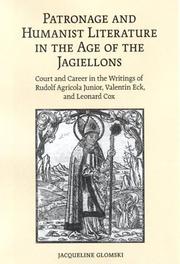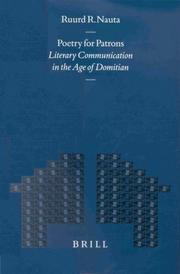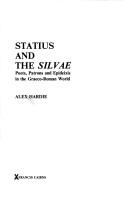| Listing 1 - 10 of 11 | << page >> |
Sort by
|
Book
ISBN: 8824308759 Year: 1990 Volume: 3 Publisher: Napoli : E. Jovene,
Abstract | Keywords | Export | Availability | Bookmark
 Loading...
Loading...Choose an application
- Reference Manager
- EndNote
- RefWorks (Direct export to RefWorks)
Authors --- Authors and patrons --- Ecrivains --- Ecrivains et mécènes --- Legal status, laws, etc. --- Social conditions --- Droit --- Législation --- Conditions sociales --- Écrivains latins --- Écrivains et mécènes --- Littérature latine --- Aspect social --- Ecrivains et mécènes --- Législation --- Conditions sociales. --- Aspect social.
Dissertation
Year: 1891 Publisher: Paris : Belin frères,
Abstract | Keywords | Export | Availability | Bookmark
 Loading...
Loading...Choose an application
- Reference Manager
- EndNote
- RefWorks (Direct export to RefWorks)
Authors and patrons. --- Authors, Latin. --- Latin literature --- Latin literature. --- Littérature latine --- Écrivains et mécènes. --- Écrivains latins. --- History and criticism. --- Histoire et critique.
Book
ISBN: 2951840349 9782951840348 Year: 2006 Volume: 19 Publisher: Boulogne: ADIREL,
Abstract | Keywords | Export | Availability | Bookmark
 Loading...
Loading...Choose an application
- Reference Manager
- EndNote
- RefWorks (Direct export to RefWorks)
Literature and state --- Art and state --- Authors and patrons --- Literary prizes --- Awards --- Littérature --- Art --- Ecrivains et mécènes --- Prix littéraires --- Prix et récompenses --- Politique gouvernementale --- Littérature --- Ecrivains et mécènes --- Prix littéraires --- Prix et récompenses

ISBN: 389500376X Year: 2004 Publisher: Wiesbaden : Reichert,
Abstract | Keywords | Export | Availability | Bookmark
 Loading...
Loading...Choose an application
- Reference Manager
- EndNote
- RefWorks (Direct export to RefWorks)
Arabic literature --- Persian literature --- Authors and patrons --- Littérature arabe --- Littérature persane --- Ecrivains et mécènes --- History and criticism. --- History. --- Histoire et critique --- Histoire --- Littérature arabe --- Littérature persane --- Ecrivains et mécènes
Book
ISBN: 9782600014014 2600014012 Year: 2010 Volume: 466 Publisher: Genève: Droz,
Abstract | Keywords | Export | Availability | Bookmark
 Loading...
Loading...Choose an application
- Reference Manager
- EndNote
- RefWorks (Direct export to RefWorks)
La figure du prince protecteur des Lettres semble relever d’une évidence que l’on n’a plus à interroger et l’histoire associe tel ou tel roi à une forme de mécénat littéraire trop aisément qualifié de politique culturelle. Entre le XVIe et le XVIIe siècle cependant, les images ne sont nées que d’une lente et complexe élaboration où se mêlent les souhaits des hommes de Lettres, les souhaits des souverains, les évolutions respectives des domaines politique et littéraire. La relation des rois de France et des hommes de Lettres – car c’est d’une relation bien plus que de l’image personnelle d’un roi-mécène qu’il s’agit à la fin – constitue en fait le lieu à la fois central et périphérique où s’est en partie jouée l’existence même des Lettres et où s’est peut-être mise en place l’une des fonctions du prince et de l’Etat moderne. Le Sceptre et la plume tente, en examinant les images royales de protection des Lettres, de retracer quelques aspects de cette relation singulière.
French literature --- Literature and state --- Authors and patrons --- Littérature française --- Littérature --- Ecrivains et mécènes --- History and criticism. --- History --- Histoire et critique --- Politique gouvernementale --- Histoire --- France --- Kings and rulers. --- Rois et souverains --- History and criticism --- Kings and rulers --- Littérature française --- Littérature --- Ecrivains et mécènes --- History of civilization --- Art --- Literature --- anno 1600-1699 --- anno 1500-1599 --- Literary patronage --- Maecenatism --- Patronage of literature --- Sponsorship of literature --- Art patronage --- Literary patrons --- French literature - 16th century - History and criticism --- French literature - 17th century - History and criticism --- Authors and patrons - France --- France - Kings and rulers --- Écrivains et mécènes --- Mécénat --- Renaissance --- 17e siècle
Book
ISBN: 9782503542386 Year: 2013 Volume: 6 Publisher: Turnhout Brepols
Abstract | Keywords | Export | Availability | Bookmark
 Loading...
Loading...Choose an application
- Reference Manager
- EndNote
- RefWorks (Direct export to RefWorks)
Campano, Giannantonio --- Authors and patrons in literature --- Clergy in literature --- Clergé dans la littérature --- Clerus in de literatuur --- Ecrivains et mécènes dans la littérature --- Schrijvers en mecenassen in de literatuur --- Campanus, Iohannes Antonius --- Criticism and interpretation --- Authors and patrons --- Italy --- History --- 16th century --- 17th century --- Occasional verse [Latin ] (Medieval and modern) --- History and criticism --- Elegiac poetry [Latin ] (Medieval and modern)

ISBN: 9780802093004 Year: 2007 Volume: 16 Publisher: Toronto ; Buffalo ; London University of Toronto Press
Abstract | Keywords | Export | Availability | Bookmark
 Loading...
Loading...Choose an application
- Reference Manager
- EndNote
- RefWorks (Direct export to RefWorks)
Authors and patrons --- Écrivains et mécènes --- European literature --- Littérature de la Renaissance --- Latin literature, Medieval and modern --- Littérature latine médiévale et moderne --- Humanism in literature. --- Humanisme --- History --- History and criticism. --- Histoire et critique --- Dans la littérature --- Agricola, Rudolph, --- Agricola, Rudolf --- Eck, Valentín, --- Eck, Valentin, --- Cox, Leonard, --- Cox, Leonard --- Criticism and interpretation. --- Critique et interprétation --- Histoire et critique. --- Dans la littérature. --- Écrivains et mécènes --- Littérature de la Renaissance --- Littérature latine médiévale et moderne --- Dans la littérature. --- Critique et interprétation
Book
ISBN: 9780415656849 0415656842 9780203077542 0203077547 1283972689 1135132321 9781135132323 9781135132279 9781135132316 9781138118591 1138118591 1135132313 Year: 2017 Volume: 21 Publisher: New York: Routledge,
Abstract | Keywords | Export | Availability | Bookmark
 Loading...
Loading...Choose an application
- Reference Manager
- EndNote
- RefWorks (Direct export to RefWorks)
This book visits the fact that, in the pre-modern world, saints and lords served structurally similar roles, acting as patrons to those beneath them on the spiritual or social ladder with the word "patron" used to designate both types of elite sponsor. Chapman argues that this elision of patron saints and patron lords remained a distinctive feature of the early modern English imagination and that it is central to some of the key works of literature in the period. Writers like Jonson, Shakespeare, Spenser, Drayton, Donne and, Milton all use medieval patron saints in order to represent and to challenge early modern ideas of patronage -- not just patronage in the narrow sense of the immediate economic relations obtaining between client and sponsor, but also patronage as a society-wide system of obligation and reward that itself crystallized a whole culture’s assumptions about order and degree. The works studied in this book -- ranging from Shakespeare’s 2 Henry VI, written early in the 1590s, to Milton’s Masque Performed at Ludlow Castle, written in 1634 -- are patronage works, either aimed at a specific patron or showing a keen awareness of the larger patronage system. This volume challenges the idea that the early modern world had shrugged off its own medieval past, instead arguing that Protestant writers in the period were actively using the medieval Catholic ideal of the saint as a means to represent contemporary systems of hierarchy and dependence. Saints had been the ideal -- and idealized -- patrons of the medieval world and remained so for early modern English recusants. As a result, their legends and iconographies provided early modern Protestant authors with the perfect tool for thinking about the urgent and complex question of who owed allegiance to whom in a rapidly changing world.
English literature --- Authors and patrons --- Christian patron saints. --- Saints in literature. --- Religion and literature --- Literary patrons --- Littérature anglaise --- Ecrivains et mécènes --- Saints patrons chrétiens --- Saints dans la littérature --- Religion et littérature --- Mécènes de la littérature --- History and criticism. --- History --- Histoire et critique --- Histoire --- Littérature anglaise --- Ecrivains et mécènes --- Saints patrons chrétiens --- Saints dans la littérature --- Religion et littérature --- Mécènes de la littérature --- Christian patron saints --- Saints in literature --- History and criticism --- English literature - Early modern, 1500-1700 - History and criticism --- Authors and patrons - England - History - 16th century --- Authors and patrons - England - History - 17th century --- Religion and literature - England - History - 16th century --- Religion and literature - England - History - 17th century --- Literary patrons - Great Britain --- Patrons

ISBN: 9004108858 9004351140 9789004108851 9789004351141 Year: 2002 Volume: 206 Publisher: Leiden: Brill,
Abstract | Keywords | Export | Availability | Bookmark
 Loading...
Loading...Choose an application
- Reference Manager
- EndNote
- RefWorks (Direct export to RefWorks)
A study of the phenomenon of literary patronage, both non-imperial and imperial, during the reign of the Roman emperor Domitian (81-96 A.D.). This work centres on the Epigrams of Martial and the Silvae of Statius. The book deals not only with the relationships between poets and patrons, but also with the audiences and the functions of patron-oriented poetry. It includes discussions of such topics as 'patronage' versus 'friendship', the poetic 'I', the role of poetry at symposia and festivals, dedication and publication, the influence of rhetoric on poetry, and the poetic representation of imperial power. The book should prove of interest not only to specialists in Roman poetry, but also to ancient historians and to students of literary patronage in other cultures. All Latin and Greek is translated.
Latin poetry --- Authors and patrons --- Poésie latine --- Ecrivains et mécènes --- History and criticism --- History --- Histoire et critique --- Histoire --- Statius, P. Papinius --- Martial. --- Domitian, --- Art patronage --- Rome --- Rome dans la littérature --- In literature --- Literary patrons --- History and criticism. --- -Latin poetry --- -Latin literature --- Literary patronage --- Maecenatism --- Patronage of literature --- Sponsorship of literature --- Literature and state --- Domitian Emperor of Rome --- -Martial --- Martialis, Marcus Valerius --- Martialis, M. Valerius --- Mart︠s︡ial, Valeriĭ --- Marcial, Marco Valerio --- Marziale, Marco Valerio --- Marcjalis, Marek Waleriusz --- Martialis --- Marziale --- מארטיאליס --- -In literature. --- Publius Papinius Statius --- Statius, Papinius --- Stace --- -History --- -Literary patronage --- Poésie latine --- Ecrivains et mécènes --- Rome dans la littérature --- Benefactors --- Domicyan, Tytus Flawiusz, --- Domitianus, Titus Flavius, --- Art patronage. --- Rim --- Roman Empire --- Roman Republic (510-30 B.C.) --- Romi (Empire) --- Byzantine Empire --- Rome (Italy) --- Historiography. --- In literature. --- Latin poetry - History and criticism. --- Authors and patrons - Rome. --- Literary patrons - Rome.

ISBN: 0905205138 9780905205137 Year: 1983 Volume: 9 Publisher: Liverpool: Cairns,
Abstract | Keywords | Export | Availability | Bookmark
 Loading...
Loading...Choose an application
- Reference Manager
- EndNote
- RefWorks (Direct export to RefWorks)
Statius, Publius Papinius --- Authors and patrons --- Ecrivains et mécènes --- Schrijvers en mecenassen --- Laudatory poetry, Classical --- Occasional verse, Classical --- Literary patrons --- Poets, Latin --- History and criticism --- Biography --- Statius, P Papinius --- Domitian, --- Art patronage --- Rome --- History --- Historiography --- 871 STATIUS, PUBLIUS PAPINIUS --- -Occasional verse, Classical --- -Poets, Latin --- -Authors and patrons --- -Literary patronage --- Maecenatism --- Patronage of literature --- Sponsorship of literature --- Literature and state --- Latin poets --- Classical occasional verse --- Classical poetry --- Classical laudatory poetry --- Latijnse literatuur--STATIUS, PUBLIUS PAPINIUS --- Statius, P. Papinius --- Domitian Emperor of Rome --- -Art patronage --- History and criticism. --- Biography. --- Art patronage. --- Historiography. --- 871 STATIUS, PUBLIUS PAPINIUS Latijnse literatuur--STATIUS, PUBLIUS PAPINIUS --- -Publius Papinius Statius --- Statius, Papinius --- Stace --- -Latijnse literatuur--STATIUS, PUBLIUS PAPINIUS --- -Classical laudatory poetry --- Literary patronage --- Benefactors --- Domicyan, Tytus Flawiusz, --- Domitianus, Titus Flavius, --- Rim --- Roman Empire --- Roman Republic (510-30 B.C.) --- Romi (Empire) --- Byzantine Empire --- Rome (Italy) --- Statius, P. Papinius (Publius Papinius) --- Laudatory poetry [Classical ] --- Poets [Latin ] --- Occasional verse [Classical ] --- Laudatory poetry, Classical - History and criticism --- Occasional verse, Classical - History and criticism --- Authors and patrons - Greece --- Authors and patrons - Rome --- Literary patrons - Rome --- Poets, Latin - Biography --- Statius, P Papinius - (Publius Papinius) - Silvae --- Domitian, - Emperor of Rome, - 51-96 - Art patronage --- Rome - History - Domitian, 81-96 - Historiography --- Domitian, - Emperor of Rome, - 51-96
| Listing 1 - 10 of 11 | << page >> |
Sort by
|

 Search
Search Feedback
Feedback About UniCat
About UniCat  Help
Help News
News